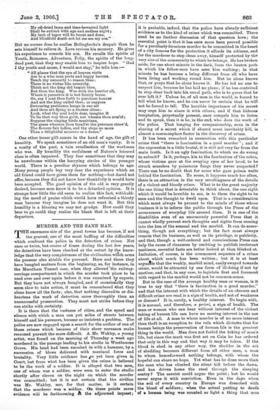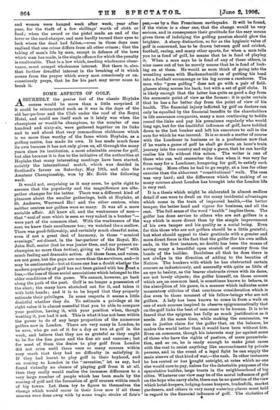MURDER AND THE SANE MAN.
It is there that the vastness of cities, and the speed and silence with which a man can put miles of streets between himself and his pursuers, become so insistent a problem. The police are now engaged upon a search for the author of one of those crimes which because of their sheer unreason make reasoned pursuit the more difficult. A Mr. Wakley, a young artist, was found on the morning of Thursday a week ago murdered in the passage leading to his studio in Westbourne Grove. His head had been smashed in with a hammer, by a succession of blows delivered with maniacal force and brutality. Very little evidence has es yet been given in Court, but from what has been given the crime is believed to be the work of a soldier. It is alleged that two men, one of whom was a soldier, were seen to enter the studio shortly after eleven on the night on which the murder was committed ; but it is not certain that the civilian was Mr. Wakley, nor, for that matter, is it certain that the murderer was a soldier. On these points more evidence will be forthcoming it the adjourned inquest; it is probable, indeed. that the police have already sufficient evidence as to the kind of crime which was committed. There need be no further discussion of that question here ; the essential point is that it has once more been proved possible for a peculiarly ferocious murder to be committed in the heart of a city famous for the protection it affords its citizens, and for the murderer to step clean away, himself protected by the very size of the community to which he belongs. He has broken aside, for one short minute in the dark, from the beaten path in which his fellow-men have seen him walking ; in that minute he has become a being different from all who have been living and working round him. But he alone knows that, or prays that he alone knows it. He has led no one to suspect him, because he has laid no plans ; if he has contrived to step clear back into his usual path, who is to guess that be ever left it P Unless he, of all men in the world, is forced to tell what he knows, and he can never be certain that he will not be forced to tell. The horrible importance of his secret may urge him to share it with others, and if that hideous temptation, perpetually present, once compels him to listen and to speak, then it is he, in the end, who does the work of • the police. That longing for companionship, even in the sharing of a secret which if shared must inevitably kill, is almost a commonplace factor in the discovery of crime.
It has been remarked in connection with this particular crime that "there is fascination in a good murder " ; and if the expression is a little brutal, it is still not very far from the main truth. Is it an ugly fascination, to which we do wrong to submit? Is it, perhaps, kin to the fascination of the cobra, whose victims gaze at the swaying eyes of her hood, to be struck senseless by poisonous fangs they never suspected? There can be no doubt that for some who gaze poison waits behind the fascination. To some, it happens much too often, there is an attraction in the very revoltingness of the details of a violent and bloody crime. What is to the great majority the one thing that is detestable to think about, the one sight which it would be horrible to see, is to them the sight to be seen and the thought to dwell upon. That is a consideration which must always be present to the minds of those whose business it is to inform the public through the Press of the occurrences of everyday life around them. It is one of the disabilities even of an enormously powerful Press that it cannot wholly prevent such thoughts and sights from coming into the ken of the sensual and the morbid. It can do some- thing, though not everything; but the fact must always remain that its business, as well as its privilege, is publicity, and that, though a well-ordered and conscientious Press can help the cause of cleanness by omitting to publish irrelevant nastiness, essential facts are better looked at than blinked at. Imitation, of course, is the commonest sequence of a crime about which' much has been written ; but it is at least arguatle that the weakly, morbid mind, easily swayed towards crime, would be attracted by one form of ill-doing if not by another, and that, in any case, to legislate first and foremost with regard to the morbid would not be common-sense.
But in the case of the average healthy man or woman, is it true to say that "there is fascination in a good murder," and that the interest with which the details of an obscure and difficult crime are read is a sign of health, and not of weakness or disease ? It is, surely, a healthy interest. To begin with, it is normal, and therefore, a priori, a sign of health. The man or woman who can hear without interest of the violent taking of human life can have no moving interest in the use of life at alL A man to whom murder is of no more interest than theft is an exception to the rule which dictates that for human beings the preservation of human life is the greatest thing in the world. Man does not forbid the taking of man's life, but since the mark was first set on Cain he has ordered that only in this way and that way it may be taken. If the blood is shed in any other way, the shedder in the act of shedding becomes different from all other men, a man to whom henceforward nothing belongs, with whom the hopeful can share no hope. • Yet what has he done more than the man who has climbed the silent hill before the dawn, and has driven home the steel through the sleeping sentry P The casuist could argue the point ; but he would never argue it with conviction. Even in the days when the soil of every country in Europe was drenched with the blood of soldiers ; when the actual putting to death of a human being was counted so light a thing that men
and women were hanged week after week, year after year, for the theft of a few shillings' worth of cloth or food ; when the sword or the pistol made an end of the lover or the card-sharper, and men hardly turned their eyes to look where the dead had fallen,—even in those days men realised that one crime differs from all other crimes ; that the taking of man's life by man, except in defence of the laws which man has made, is the single offence for which the penalty is unalterable. That is a law which, needing wholesome obser- vance, must compel wholesome interest. But there is, also, that further dreadful interest in the breaking of it which comes from the prayer which every man consciously or un- consciously prays, that he for his part may never come to break it.







































 Previous page
Previous page